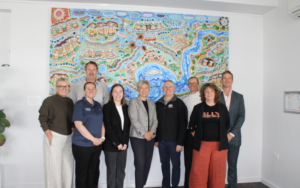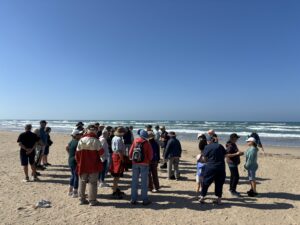Why Glacier Preservation Matters – Even in South Australia
Today, 22 March, is World Water Day! The theme for this year is ‘Glacier Preservation’, and at first glance, it may be hard to make the link between preserving glaciers and the Goyder Institute for Water Research’s location in Adelaide, South Australia – the driest State in the driest continent in the world. So, it’s worth asking: What do glaciers have to do with everyday life in South Australia?
Water is essential to life, but did you know that only 2.5% of Earth’s water is freshwater? Even more striking, just 1.2% of that is surface water, while 30.1% is groundwater and a massive 70% is locked away in glaciers and ice caps (World Meteorological Oganisation). So, while it may seem that our blue planet has lots of water, less than 1% of the Earth’s water is available for human use. Nearly 2 billion people worldwide rely on water from glaciers, snowmelt, and mountain runoff for drinking, agriculture, and energy production (UN-Water/UNESCO/USGS).
This summer, South Australia experienced its driest summer in 33 years, with rainfall far below average and water reservoirs at their lowest in over two decades. For some parts of South Australia, 2024 was the driest year on record. While glaciers may seem distant from our daily lives, they play a crucial role in the global water cycle. As they melt at record rates due to climate change, water patterns around the globe become increasingly unpredictable—leading to floods, droughts, landslides, and rising sea levels.
A Link to the Past, A Warning for the Future
South Australia’s landscapes hold deep connections to glacial history. Places like Hallett Cove Conservation Park, the Flinders Ranges, and Victor Harbor preserve evidence of ancient glaciations, with glacial deposits, rock striations, and smooth surfaces dating back to more than 250 million years ago. These remnants remind us that Earth’s climate and landscape has always changed—but today, the rapid loss of glaciers is driven by human-caused global warming.
The Role of the Goyder Institute for Water Research
Glacier loss is not just a polar issue—it affects the global water cycle and can impact regions like South Australia, which is already facing water security challenges. The Goyder Institute for Water Research is at the forefront of creating and sharing knowledge to tackle these challenges through:
???? Climate Resilience & Water Security – Researching how changing water cycles affect rainfall, groundwater, and long-term water availability in South Australia.
???? Adapting to Water Scarcity – Changing water availability requiresdeveloping alternative water sources (such as desalination, managed aquifer recharge, water re-use and groundwater use) and examining how current water sources can be sustainably managed.
???? Protecting Ecosystems & Agriculture – Just as glacial melt disrupts ecosystems and farming; South Australia’s agriculture is adapting to reduced rainfall and climate variability—a key focus of the Institute’s work.
???? Learning from the Past to Protect the Future – Just as South Australia’s landscapes hold evidence of past glaciations, the Institute’s research into paleoclimate and water history helps predict future water availability and guide climate adaptation strategies.
Why Glacier Preservation Matters Now
The message for World Water Day 2025 is clear:
❄️ Glaciers are melting faster than ever. As the planet heats up, our frozen world is shrinking, making the water cycle more unpredictable.
???? Meltwater changes impact billions. Shifting water flows lead to floods, droughts, landslides, and rising sea levels, threatening ecosystems and communities.
???? Preserving glaciers is a survival strategy. Reducing greenhouse gas emissions and managing meltwater sustainably is crucial for the future of our planet.
While glaciers may seem far removed from South Australia, their decline has ripple effects worldwide – including changing rainfall patterns, water availability, and agricultural productivity. The work of the Goyder Institute for Water Research aligns with the goals of World Water Day 2025, ensuring that South Australia remains resilient in the face of a changing water future.
By working together to reduce global warming and adapt to shrinking glaciers, we can help protect our water, our communities, and our environment.



